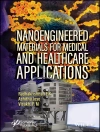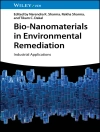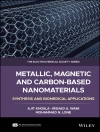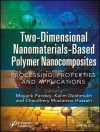Offering first-hand insights by top scientists and industry experts at the forefront of R&D into nanoelectronics, this book neatly links the underlying technological principles with present and future applications.
A brief introduction is followed by an overview of present and emerging logic devices, memories and power technologies. Specific chapters are dedicated to the enabling factors, such as new materials, characterization techniques, smart manufacturing and advanced circuit design. The second part of the book provides detailed coverage of the current state and showcases real future applications in a wide range of fields: safety, transport, medicine, environment, manufacturing, and social life, including an analysis of emerging trends in the internet of things and cyber-physical systems. A survey of main economic factors and trends concludes the book.
Highlighting the importance of nanoelectronics in the core fields of communication and information technology, this is essential reading for materials scientists, electronics and electrical engineers, as well as those working in the semiconductor and sensor industries.
Mục lục
Foreword by Andreas Wild XXV
Nanoelectronics for Digital Agenda by Paul Rübig and Livio Baldi XXXVII
Electronics on the EU’s Political Agenda by Carl-Christian Buhr XLI
Preface by Livio Baldi and Marcel H. van de Voorde XLVII
Volume 1
Part One Fundamentals on Nanoelectronics 1
1 A Brief History of the Semiconductor Industry 3
Paolo A. Gargini
1.1 From Microelectronics to Nanoelectronics and Beyond 3
1.2 The Growth of the Semiconductor Industry: An Eyewitness Report 22
Acknowledgments 52
2 More-than-Moore Technologies and Applications 53
Joachim Pelka and Livio Baldi
2.1 Introduction 53
2.2 ‘More Moore’ and ‘More-than-Moore’ 54
2.3 From Applications to Technology 56
2.4 More-than-Moore Devices 58
2.5 Application Domains 61
2.6 Conclusions 70
Acknowledgement 71
References 71
3 Logic Devices Challenges and Opportunities in the Nano Era 73
Frédéric Boeuf
3.1 Introduction: Dennard’s Scaling and Moore’s Law Trends and Limits 73
3.2 Power Performance Trade-Off for 10 nm, 7 nm, and Below 75
3.3 Device Structures and Materials in Advanced CMOS Nodes 89
4 Memory Technologies 113
Barbara De Salvo and Livio Baldi
4.1 Introduction 113
4.2 Mainstream Memories (DRAM and NAND): Evolution and Scaling Limits 115
4.3 Emerging Memories Technologies 120
4.4 Emerging Memories Architectures 130
4.5 Opportunities for Emerging Memories 133
4.6 Conclusions 134
Part Two Devices in the Nano Era 137
5 Beyond-CMOS Low-Power Devices: Steep-Slope Switches for Computation and Sensing 139
Adrian M. Ionescu
5.1 Digital Computing in Post-Dennard Nanoelectronics Era 139
5.2 Beyond CMOS Steep-Slope Switches 143
5.3 Convergence of Requirements for Energy-Efficient Computing and Sensing Technologies: Enabling Smart Autonomous Systems for Io E 148
5.4 Conclusions and Perspectives 149
References 151
6 RF CMOS 153
Patrick Reynaert, Wouter Steyaert and Marco Vigilante
6.1 Introduction 153
6.2 Toward 5G and Beyond 153
6.3 CMOS @ Millimeter-Wave: Challenges and Opportunities 156
6.4 Terahertz in CMOS 159
6.5 Conclusions 161
References 162
7 Smart Power Devices Nanotechnology 163
Gaudenzio Meneghesso, Peter Moens, Mikael Östling, Jan Sonsky, and Steve Stoffels
7.1 Introduction 163
7.2 Si Power Devices 164
7.3 Si C Power Semiconductor Devices 176
7.4 Power Ga N Device Technology 184
7.5 New Materials and Substrates for WBG Power Devices 198
References 201
8 Integrated Sensors and Actuators: Their Nano-Enabled Evolution into the Twenty-First Century 205
Frederik Ceyssens and Robert Puers
8.1 Introduction 205
8.2 Sensors 208
8.3 Actuators 214
8.4 Molecular Motors 217
8.5 Transducer Integration and Connectivity 218
8.6 Conclusion 219
References 220
Part Three Advanced Materials and Materials Combinations 223
9 Silicon Wafers as a Foundation for Growth 225
Peter Stallhofer
9.1 Introduction 225
9.2 Si Availability and Technologies to Produce Hyperpure Silicon in Large Quantities 226
9.3 The Exceptional Physical and Technological Properties of Monocrystalline Silicon for Device Manufacturing 237
9.4 Silicon and New Materials 241
9.5 Example of Actual Advanced 300 mm Wafer Specification for Key Parameters 242
Acknowledgments 242
References 242
10 Nanoanalysis 245
Narciso Gambacorti
10.1 Three-Dimensional Analysis 246
10.2 Strain Analysis 250
10.3 Compositional and Chemical Analysis 256
10.4 Conclusions 260
Glossary 261
Acknowledgments 262
References 262
Part Four Semiconductor Smart Manufacturing 265
11 Front-End Processes 267
Marcello Mariani and Nicolas Possémé
11.1 A Standard MOS FEOL Process Flow 267
11.2 Cleaning 268
11.3 Silicon Oxidation 271
11.4 Doping and Dopant Activation 272
11.5 Deposition 275
11.6 Etching 279
Bibliography 288
12 Lithography for Nanoelectronics 289
Kurt Ronse
12.1 Historical Perspective of Lithography for Nanoelectronics 289
12.2 Challenges for Lithography in Future Technology Nodes 292
12.3 Pattern Roughness: The Biggest Challenge for Geometrical Scaling 311
12.4 Lithography Options in Previous and Future Technology Nodes 313
References 315
13 Reliability of Nanoelectronic Devices 317
Anthony S. Oates and K.P. Cheung
13.1 Introduction 317
13.2 Interconnect Reliability Issues 318
13.3 Transistor Reliability Issues 322
13.4 Radiation-Induced Soft Errors in Silicon Circuits 325
13.5 Conclusions 327
Acknowledgments 328
References 328
Volume 2
Part Five Circuit Design in Emerging Nanotechnologies 331
14 Logic Synthesis of CMOS Circuits and Beyond 333
Enrico Macii, Andreas Calimera, Alberto Macii, and Massimo Poncino
14.1 Context and Motivation 333
14.2 The Origin: Area and Delay Optimization 335
14.3 The Power Wall 340
14.4 Synthesis in the Nanometer Era: Variation-Aware 345
14.5 Emerging Trends in Logic Synthesis and Optimization 350
14.6 Summary 358
References 358
15 System Design in the Cyber-Physical Era 363
Pierluigi Nuzzo and Alberto Sangiovanni-Vincentelli
15.1 From Nanodevices to Cyber-Physical Systems 363
15.2 Cyber-Physical System Design Challenges 365
15.3 A Structured Methodology to Address the Design Challenges 370
15.4 Platform-Based Design with Contracts and Related Tools 380
15.5 Conclusions 390
Acknowledgments 390
References 390
16 Heterogeneous Systems 397
Daniel Lapadatu
16.1 Introduction 397
16.2 Heterogeneous Systems Design 400
16.3 Heterogeneous Systems Integration 414
16.4 Testing the Performance and Reliability of Heterogeneous Systems 418
16.5 Conclusions 423
Acknowledgments 424
References 424
17 Nanotechnologies Testing 427
Ernesto Sanchez and Matteo Sonza Reorda
17.1 Introduction 427
17.2 Background 428
17.3 Current Challenges 433
17.4 Testing Advanced Technologies 437
17.5 Conclusions 444
References 444
Part Six Nanoelectronics-Enabled Sectors and Societal Challenges 447
18 Industrial Applications 449
L. Baldi and M. Van de Voorde
18.1 Introduction 449
18.2 Health, Demographic Change, and Well-being 450
18.3 Food Security, Sustainable Agriculture and Forestry, Marine and Maritime and Inland Water Research, and the Bioeconomy 450
18.4 Secure, Clean, and Efficient Energy 451
18.5 Smart, Green, and Integrated Transport 451
18.6 Climate Action, Environment, Resource Efficiency, and Raw Materials 452
18.7 Europe in a Changing World – Inclusive, Innovative, and Reflective Societies 452
18.8 Secure Societies – Protecting Freedom and Security of Europe and Its Citizens 452
19 Health 455
Walter De Raedt and Chris Van Hoof
19.1 Introduction 455
19.2 The Worldwide Context 455
19.3 Requirements and Use Cases for Emerging Wearables 459
19.4 Conclusions 467
References 468
20 Smart Energy 471
Moritz Loske
20.1 Energy Revolution – Why Energy Does Have to Become Smart? 471
20.2 Applications of Smart Energy Systems and their Societal Challenges 476
20.3 Nanoelectronics as Key Enabler for Smart Energy Systems 483
20.4 Summary and Outlook 486
References 487
21 Validation of Highly Automated Safe and Secure Vehicles 489
Michael Paulweber
21.1 Introduction 489
21.2 Societal Challenges 490
21.3 Automated Vehicles 491
21.4 Key Requirements to Automated Driving Systems 493
21.5 Validation Challenges 496
21.6 Validation Concepts 497
21.7 Challenges to Electronics Platform for Automated Driving Systems 498
21.8 Conclusion 499
References 499
22 Nanotechnology for Consumer Electronics 501
Hannah M. Gramling, Michail E. Kiziroglou, and Eric M. Yeatman
22.1 Introduction 501
22.2 Communications 503
22.3 Energy Storage 506
22.4 Sensors 509
22.5 Internet-of-Things Applications 514
22.6 Display Technologies 515
22.7 Conclusions 520
References 520
Part Seven From Device to Systems 527
23 Nanoelectronics for Smart Cities 529
Joachim Pelka
23.1 Why ‘Smart Cities’? 529
23.2 Infrastructure: All You Need Is Information 531
23.3 Nothing Will Work Without Energy 535
23.4 Application: What Can Be Done with Information 537
23.5 Trusted Hardware: Not Only for Data Security 546
23.6 Closing Remarks 548
Acknowledgement 548
Part Eight Industrialization: Economics/Markets – Business Values – European Visions – Technology Renewal and Extended Functionality 551
24 Europe Positioning in Nanoelectronics 553
Andreas Wild
24.1 What is the ‘European’ Industry 553
24.2 European Strategic Initiatives 554
24.3 Policy Implementation Instruments 556
24.4 Europe’s Market Position 558
24.5 European Perspectives 564
25 Thirty Years of Cooperative Research and Innovation in Europe: The Case for Micro- and Nanoelectronics and Smart Systems Integration 567
Dirk Beernaert and Eric Fribourg-Blanc
25.1 Introduction 567
25.2 Nanoelectronics and Micro-Nanotechnology in the European Research Programs 570
25.3 A Bit of History Seen from an ICT: Nanoelectronics Integrated Hardware Perspective 571
25.4 ESPRIT I, II, III, and IV 572
25.5 The 5th Framework (1998–2002) 574
25.6 The 6th Framework (2002–2006) 575
25.7 The 7th Framework (2007–2013) 576
25.8 H2020 (2014–2020) 579
25.9 Some Results of FP7 and H2020 581
25.10 Results of the JTI ENIAC and ARTEMIS 583
25.11 An Analysis of Beyond CMOS in FP7 and H2020 584
25.12 MEMS, Smart Sensors, and Devices Related to Internet of Things 586
25.13 From FP6 to FP7: An integrated approach for micro-nanoelectronics and micro-nanosystems 587
25.14 Enabling the EU 2050+ Future: Superintelligence, Humanity, and the ‘Singularity’ 589
25.15 EU 2050±: Driven by a Superintelligence Ambient 590
25.16 Conclusion 592
26 The Education Challenge in Nanoelectronics 595
Susanna M. Thon, Sean L. Evans, and Annastasiah Mudiwa Mhaka
26.1 Introduction 595
26.2 Traditional Programs in Nanoelectronics Education 596
26.3 Challenges in Nanoelectronics Education 600
26.4 New Cross-Discipline Applications 604
26.5 Future Education Programs 605
Acknowledgments 610
References 610
27 Conclusions 613
Robert Puers, Livio Baldi, and Marcel Van de Voorde 613
Index 617
Giới thiệu về tác giả
Robert Puers is Professor at the Faculty of Engineering of the Catholic University Leuven, Belgium, and Chair of the Leuven Nanocenter. He is a European research pioneer in micromachining, MEMS and packaging techniques, focused on biomedical implantable systems. Robert Puers took major efforts to increase the impact of MEMS in the international research community, in education as well as in industry. To commercialize his academic research achievements, he launched three spin-off companies, ICSense, Zenso and Min DCet.
Livio Baldi is currently a freelance consultant to Lfoundry S.r.l. He graduated in electronic engineering at the University of Pavia, Italy, and joined the company SGS-ATES (now STMicroelectronics) where he held various positions inside Central R&D. Later he was in charge of cooperative research projects for STMicroelectronics, within Framework Programmes and EUREKA programs for Nanoelectronics (MEDEA and CATRENE). He participated in setting-up the ETP Nanolectronics and has been active in the ENIAC and ECSEL JTIs.
Marcel Van de Voorde has 40 years` experience in European Research Organisations including CERN-Geneva, European Commission, with 10 years at the Max Planck Institute in Stuttgart, Germany. For many years, he was involved in research and research strategies, policy and management, especially in European research institutions. He holds a Professorship at the University of Technology in Delft, the Netherlands, as well as multiple visiting professorships in Europe and worldwide. He holds a doctor honoris causa and various honorary Professorships.
He is senator of the European Academy for Sciences and Arts, in Salzburg and Fellow of the World Academy for Sciences. He is a Fellow of various scientific societies and has been decorated by the Belgian King. He has authored of multiple scientific and technical publications and co-edited multiple books in the field of nanoscience and nanotechnology.
Sebastiaan E. van Nooten is currently an independent consultant to the semiconductor and semi-conductor equipment industry. After his graduation from the Technical University of Delft, The Netherlands, he joined the German company Telefunken. Subsequently, he held various positions in different companies in the European semiconductor equipment industry. Since 2007 he was engaged in several European cluster programs such as CATRENE and as project coordinator for ENIAC projects, a public-private partnership in nanoelectronics.












